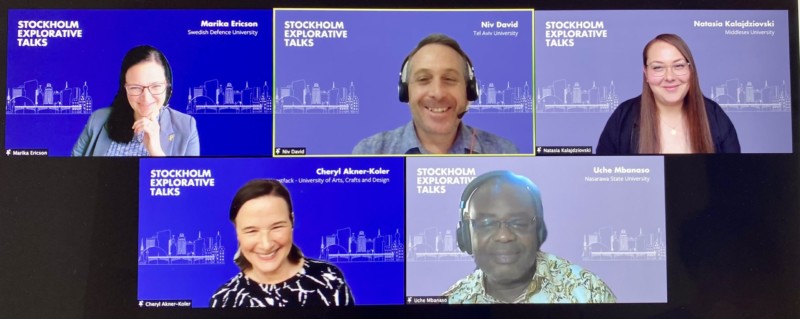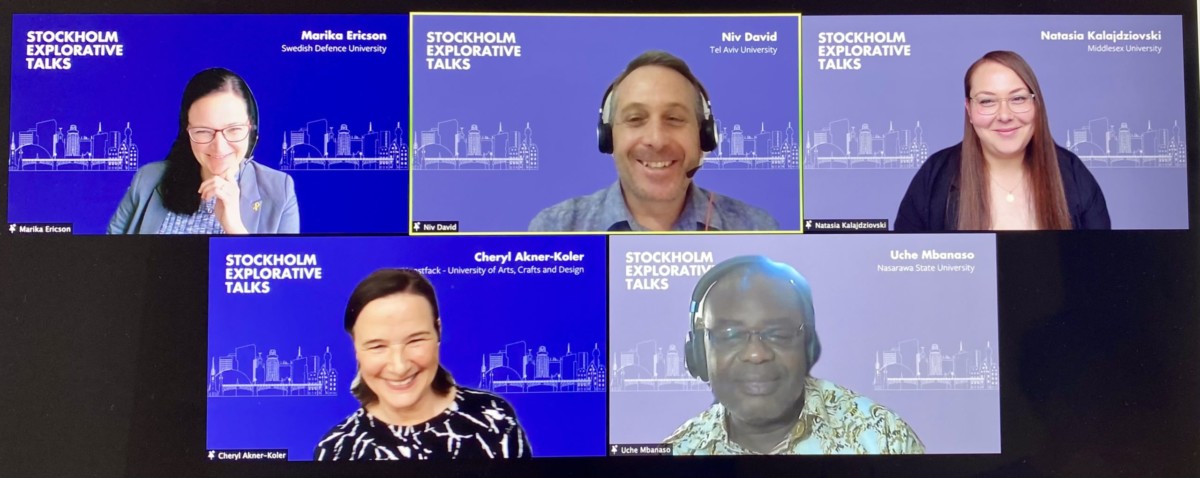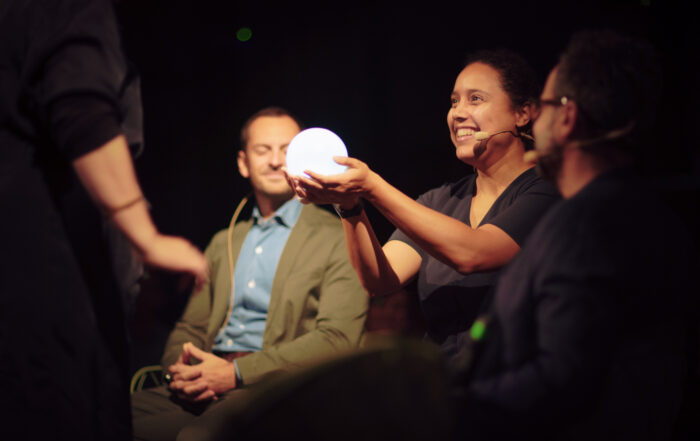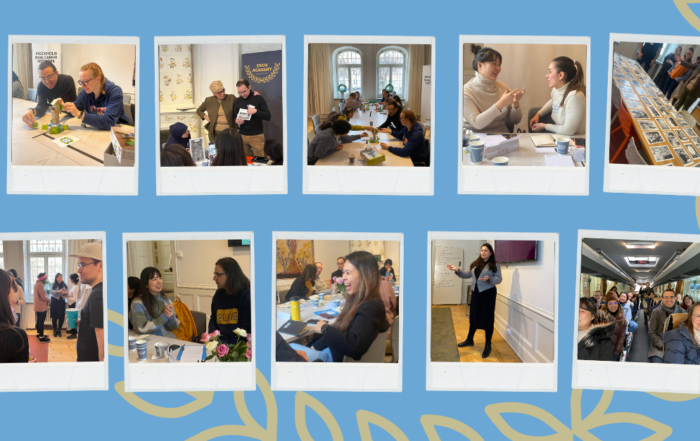

4 maj, 2021
The Force is strong with the Explorations!
‘Cyber Warfare: Understanding digital aggressions and their implications for the future’ was the topic explored at the second pitstop of The Stockholm Explorative Talks webinar series. The explorers – Marika Ericson, Niv David, Natasia Kalajdziovski, Cheryl Akner-Koler and Uche Mbanaso – engaged in an interdisciplinary discussion about the nature of modern-day cyber operations, which was molded and informed by the unique perspectives they brought from their respective disciplines. The exploration was attended by a worldwide-audience from 22 countries with as many academic domains and professional backgrounds between them.
There was not a dull moment in the hour and a half-long discussion, as the explorers delved deep into the topic, examining it from various angles such as – the dichotomy between war and peace as viewed by law and the legally undefined grey area between these, the presence of both states and private players in an ever-expanding cyberspace, how states define their digital territory while playing on the lack of deniability and attribution, the pervasiveness of cyber operations and their everyday impact on the common citizen, the changing nature of war and the ‘regularity’ of cyber engagements by dint of their apparent non-violence, aesthetic views of intelligence and perception, the implications on democracy of an invisible war fought against data through data – and many more. The discussion also went on to touch upon some aspects of pop culture in this context, such as gaming, popular depictions of cyber punk, and the psychological-sensory dimension to cyber engagements. The exploration capped off with the speakers sounding off on what they thought a world with cyber operations would look like in the future, and what states could collectively do to ensure a safer cyberspace.
This was the second exploration of The Stockholm Explorative Talks webinar series. We have six more interesting discussions coming up, as we keep growing and spreading across a wider global audience. Check out our event calendar and join us in exploring the future together!
 Marika Ericson is Head of the Center for International and Operational Law at the Swedish Defense University. She holds a Doctor of Laws (jur.dr.) in International Law from Uppsala University. She has a background as a legal advisor in the Swedish Armed Forces in Sweden and abroad, and from the Swedish Emergency Management Agency. Ericson teaches and researches in the field of international and national law, with a focus on cyber operations, emergency management, the whole of government approach (total defense) and state of emergency.
Marika Ericson is Head of the Center for International and Operational Law at the Swedish Defense University. She holds a Doctor of Laws (jur.dr.) in International Law from Uppsala University. She has a background as a legal advisor in the Swedish Armed Forces in Sweden and abroad, and from the Swedish Emergency Management Agency. Ericson teaches and researches in the field of international and national law, with a focus on cyber operations, emergency management, the whole of government approach (total defense) and state of emergency.
 Niv David is a cyber executive, lecturer and critical thinker with an experience of 25 years at the forefront of information security, cyber security and global cyber conflict. David is a fellow and lecturer with the Blavatnik Interdisciplinary Cyber Research Center (ICRC) at Tel Aviv University and Cyber Security Director for Ericsson North America, focusing on global connectivity, 5G and national critical infrastructure cyber security. He has held various positions in the private and public sectors, specializing in complex and real-time systems security, aerospace platforms security and cyber operations research from a political science perspective.
Niv David is a cyber executive, lecturer and critical thinker with an experience of 25 years at the forefront of information security, cyber security and global cyber conflict. David is a fellow and lecturer with the Blavatnik Interdisciplinary Cyber Research Center (ICRC) at Tel Aviv University and Cyber Security Director for Ericsson North America, focusing on global connectivity, 5G and national critical infrastructure cyber security. He has held various positions in the private and public sectors, specializing in complex and real-time systems security, aerospace platforms security and cyber operations research from a political science perspective.
 Natasia Kalajdziovski is a PhD candidate at Middlesex University, a junior research affiliate with the Canadian Network for Research on Terrorism, Security and Society (TSAS), and an elected postgraduate member of the Royal Historical Society. Kalajdziovski holds a first-class MA from the Department of War Studies, King’s College London, and a BA (Hons) from the Department of History at the University of Toronto. Her research examines the question of moral conduct in intelligence practice within the national security context of counterterrorism, using historical case studies as the foundation of her research.
Natasia Kalajdziovski is a PhD candidate at Middlesex University, a junior research affiliate with the Canadian Network for Research on Terrorism, Security and Society (TSAS), and an elected postgraduate member of the Royal Historical Society. Kalajdziovski holds a first-class MA from the Department of War Studies, King’s College London, and a BA (Hons) from the Department of History at the University of Toronto. Her research examines the question of moral conduct in intelligence practice within the national security context of counterterrorism, using historical case studies as the foundation of her research.
 Cheryl Akner-Koler is Professor of Theoretical and Applied Aesthetics at Konstfack – University of Arts, Crafts and Design. Her research interests pivot around how everyday aesthetic experiences in the real world drive creative processes. She also investigates the haptic aspects of movement, touch, taste and smell within the field of aesthetics. Her current research project is funded by the Swedish Research Council. It is a collaborative project, entitled HAPTICA a collaborative project with culinary artists from Campus Grythyttan, Örebro University.
Cheryl Akner-Koler is Professor of Theoretical and Applied Aesthetics at Konstfack – University of Arts, Crafts and Design. Her research interests pivot around how everyday aesthetic experiences in the real world drive creative processes. She also investigates the haptic aspects of movement, touch, taste and smell within the field of aesthetics. Her current research project is funded by the Swedish Research Council. It is a collaborative project, entitled HAPTICA a collaborative project with culinary artists from Campus Grythyttan, Örebro University.
 Uche Mbanaso is the Executive Director, Center for Cyberspace Studies at Nasarawa State University, Keffi, Nigeria. He has a PhD in Information and Communications Security from the University of Salford, and is a Visiting Scholar at the LINK Center, University of Witwatersrand. Mbanaso is an expert in Applied Cryptography and Cybersecurity, and has a blend of academic and industry experience in Cyber Warfare and Smart Technology. He was a central contributor in the drafting of Nigeria’s National Cybersecurity Strategy and Policy of 2015 and the Nigerian Cybercrime Act of 2015 as well as National Cybersecurity Policy and Strategy, 2021.
Uche Mbanaso is the Executive Director, Center for Cyberspace Studies at Nasarawa State University, Keffi, Nigeria. He has a PhD in Information and Communications Security from the University of Salford, and is a Visiting Scholar at the LINK Center, University of Witwatersrand. Mbanaso is an expert in Applied Cryptography and Cybersecurity, and has a blend of academic and industry experience in Cyber Warfare and Smart Technology. He was a central contributor in the drafting of Nigeria’s National Cybersecurity Strategy and Policy of 2015 and the Nigerian Cybercrime Act of 2015 as well as National Cybersecurity Policy and Strategy, 2021.
4 maj, 2021
The Force is strong with the Explorations!
‘Cyber Warfare: Understanding digital aggressions and their implications for the future’ was the topic explored at the second pitstop of The Stockholm Explorative Talks webinar series. The explorers – Marika Ericson, Niv David, Natasia Kalajdziovski, Cheryl Akner-Koler and Uche Mbanaso – engaged in an interdisciplinary discussion about the nature of modern-day cyber operations, which was molded and informed by the unique perspectives they brought from their respective disciplines. The exploration was attended by a worldwide-audience from 22 countries with as many academic domains and professional backgrounds between them.
There was not a dull moment in the hour and a half-long discussion, as the explorers delved deep into the topic, examining it from various angles such as – the dichotomy between war and peace as viewed by law and the legally undefined grey area between these, the presence of both states and private players in an ever-expanding cyberspace, how states define their digital territory while playing on the lack of deniability and attribution, the pervasiveness of cyber operations and their everyday impact on the common citizen, the changing nature of war and the ‘regularity’ of cyber engagements by dint of their apparent non-violence, aesthetic views of intelligence and perception, the implications on democracy of an invisible war fought against data through data – and many more. The discussion also went on to touch upon some aspects of pop culture in this context, such as gaming, popular depictions of cyber punk, and the psychological-sensory dimension to cyber engagements. The exploration capped off with the speakers sounding off on what they thought a world with cyber operations would look like in the future, and what states could collectively do to ensure a safer cyberspace.
This was the second exploration of The Stockholm Explorative Talks webinar series. We have six more interesting discussions coming up, as we keep growing and spreading across a wider global audience. Check out our event calendar and join us in exploring the future together!
 Marika Ericson is Head of the Center for International and Operational Law at the Swedish Defense University. She holds a Doctor of Laws (jur.dr.) in International Law from Uppsala University. She has a background as a legal advisor in the Swedish Armed Forces in Sweden and abroad, and from the Swedish Emergency Management Agency. Ericson teaches and researches in the field of international and national law, with a focus on cyber operations, emergency management, the whole of government approach (total defense) and state of emergency.
Marika Ericson is Head of the Center for International and Operational Law at the Swedish Defense University. She holds a Doctor of Laws (jur.dr.) in International Law from Uppsala University. She has a background as a legal advisor in the Swedish Armed Forces in Sweden and abroad, and from the Swedish Emergency Management Agency. Ericson teaches and researches in the field of international and national law, with a focus on cyber operations, emergency management, the whole of government approach (total defense) and state of emergency.
 Niv David is a cyber executive, lecturer and critical thinker with an experience of 25 years at the forefront of information security, cyber security and global cyber conflict. David is a fellow and lecturer with the Blavatnik Interdisciplinary Cyber Research Center (ICRC) at Tel Aviv University and Cyber Security Director for Ericsson North America, focusing on global connectivity, 5G and national critical infrastructure cyber security. He has held various positions in the private and public sectors, specializing in complex and real-time systems security, aerospace platforms security and cyber operations research from a political science perspective.
Niv David is a cyber executive, lecturer and critical thinker with an experience of 25 years at the forefront of information security, cyber security and global cyber conflict. David is a fellow and lecturer with the Blavatnik Interdisciplinary Cyber Research Center (ICRC) at Tel Aviv University and Cyber Security Director for Ericsson North America, focusing on global connectivity, 5G and national critical infrastructure cyber security. He has held various positions in the private and public sectors, specializing in complex and real-time systems security, aerospace platforms security and cyber operations research from a political science perspective.
 Natasia Kalajdziovski is a PhD candidate at Middlesex University, a junior research affiliate with the Canadian Network for Research on Terrorism, Security and Society (TSAS), and an elected postgraduate member of the Royal Historical Society. Kalajdziovski holds a first-class MA from the Department of War Studies, King’s College London, and a BA (Hons) from the Department of History at the University of Toronto. Her research examines the question of moral conduct in intelligence practice within the national security context of counterterrorism, using historical case studies as the foundation of her research.
Natasia Kalajdziovski is a PhD candidate at Middlesex University, a junior research affiliate with the Canadian Network for Research on Terrorism, Security and Society (TSAS), and an elected postgraduate member of the Royal Historical Society. Kalajdziovski holds a first-class MA from the Department of War Studies, King’s College London, and a BA (Hons) from the Department of History at the University of Toronto. Her research examines the question of moral conduct in intelligence practice within the national security context of counterterrorism, using historical case studies as the foundation of her research.
 Cheryl Akner-Koler is Professor of Theoretical and Applied Aesthetics at Konstfack – University of Arts, Crafts and Design. Her research interests pivot around how everyday aesthetic experiences in the real world drive creative processes. She also investigates the haptic aspects of movement, touch, taste and smell within the field of aesthetics. Her current research project is funded by the Swedish Research Council. It is a collaborative project, entitled HAPTICA a collaborative project with culinary artists from Campus Grythyttan, Örebro University.
Cheryl Akner-Koler is Professor of Theoretical and Applied Aesthetics at Konstfack – University of Arts, Crafts and Design. Her research interests pivot around how everyday aesthetic experiences in the real world drive creative processes. She also investigates the haptic aspects of movement, touch, taste and smell within the field of aesthetics. Her current research project is funded by the Swedish Research Council. It is a collaborative project, entitled HAPTICA a collaborative project with culinary artists from Campus Grythyttan, Örebro University.
 Uche Mbanaso is the Executive Director, Center for Cyberspace Studies at Nasarawa State University, Keffi, Nigeria. He has a PhD in Information and Communications Security from the University of Salford, and is a Visiting Scholar at the LINK Center, University of Witwatersrand. Mbanaso is an expert in Applied Cryptography and Cybersecurity, and has a blend of academic and industry experience in Cyber Warfare and Smart Technology. He was a central contributor in the drafting of Nigeria’s National Cybersecurity Strategy and Policy of 2015 and the Nigerian Cybercrime Act of 2015 as well as National Cybersecurity Policy and Strategy, 2021.
Uche Mbanaso is the Executive Director, Center for Cyberspace Studies at Nasarawa State University, Keffi, Nigeria. He has a PhD in Information and Communications Security from the University of Salford, and is a Visiting Scholar at the LINK Center, University of Witwatersrand. Mbanaso is an expert in Applied Cryptography and Cybersecurity, and has a blend of academic and industry experience in Cyber Warfare and Smart Technology. He was a central contributor in the drafting of Nigeria’s National Cybersecurity Strategy and Policy of 2015 and the Nigerian Cybercrime Act of 2015 as well as National Cybersecurity Policy and Strategy, 2021.




